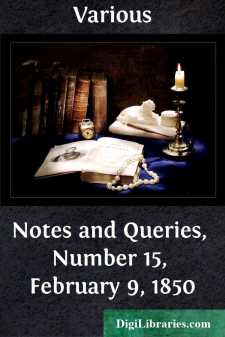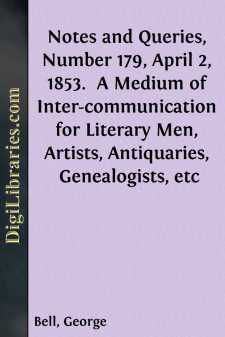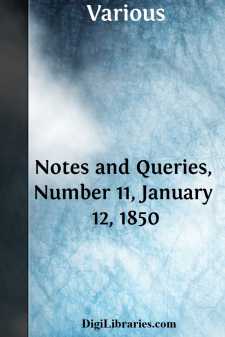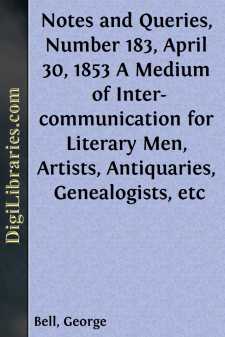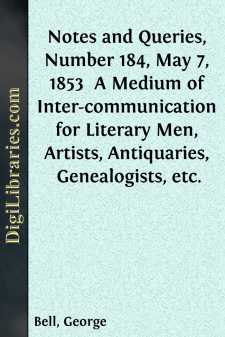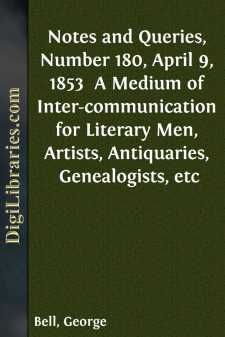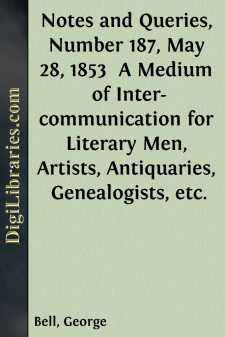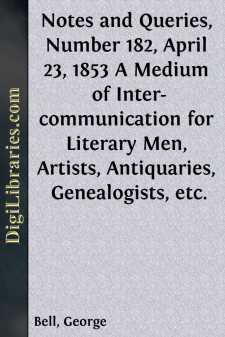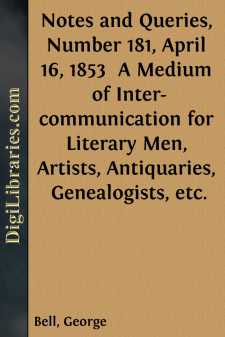Periodicals
- Art 27
- Children's periodicals 59
- Entertainment 5
- Food/Wine 2
- Games/Humor 455
- General
- Health 1
- History 53
- House/Home 1
- Regional 62
- Science/Nature 118
- Transportation 10
General Books
Sort by:
by:
Various
ENGLISH AND AMERICAN REPRINTS OF OLD BOOKS Most people are aware of the great demand there is for English literature, and indeed for all literature in the United States: for some years the anxiety of persons in that part of the world to obtain copies of our early printed books, prose, poetry, and plays, has been well known to such as collect and sell them on this side of the water. Where American...
more...
by:
Various
MARLOWE AND THE OLD “TAMING OF A SHREW.” I regret that my communication (No. 13. p. 194.), on the subject of the authorship of The Taming of a Shrew, was too late to be of any avail for the already-published new edition of Marlowe’s works; and, had I been aware of such being the case, I should have waited until I had had an opportunity of seeing a work whose editor may entertain views in...
more...
by:
George Bell
JACK. I wish to note, and to suggest to students in ethnology, the Query, how it comes to pass that John Bull has a peculiar propensity to call things by his own name, his familiar appellative of Jack? Of all the long list of abbreviations and familiar names with which times past and present have supplied us, that which honest Falstaff found most pleasing to his ears, "Jack with my familiars!"...
more...
by:
Various
SIR EDWARD DERING'S HOUSEHOLD BOOK, A.D. 1648-52. About ten years since, I remember seeing, in the hands of a London bookseller, a curious MS. purporting to be the "Household Book of Receipts and Expences of Sir Edward Dering, Bart., of Surrenden Dering, Kent, from Lady-Day, 1648, to April, 1652." It was a think folio, in the original binding, entirely in the hand-writing of the...
more...
by:
George Bell
PROCLAMATION OF HENRY VIII. AGAINST THE POSSESSION OF RELIGIOUS BOOKS. The progress of the Reformation in England must have been greatly affected by the extent to which the art of printing was brought to bear upon the popular mind. Before the charms of Anne Boleyn could have had much effect, or "doubts" had troubled the royal conscience, Wolsey had been compelled to forbid the introduction or...
more...
by:
George Bell
OLD POPULAR POETRY: "ADAM BELL, CLYM OF THE CLOUGH, AND WILLIAM OF CLOWDESLY." I have very recently become possessed of a curious printed fragment, which is worth notice on several accounts, and will be especially interesting to persons who, like myself, are lovers of our early ballad poetry. It is part of an unknown edition of the celebrated poem relating to the adventures of Adam Bell, Clym...
more...
by:
George Bell
RIGBY CORRESPONDENCE. [We are enabled, by the kindness of their possessor, to lay before our readers copies of the following characteristic letters from the well-known Richard Rigby, Esq., who was for so many years the leader of the Bedford party in the House of Commons. They were addressed to Robert Fitzgerald, Esq., a member of the House of Commons in Ireland, and Judge of the Court of Admiralty in...
more...
by:
George Bell
ON CHAUCER'S KNOWLEDGE OF ITALIAN. In the Memoir prefixed to the Aldine edition of the Poetical Works of Chaucer, London, 1845, Sir Harris Nicolas expresses an opinion that Dan Geoffrey was not acquainted with the Italian language, and therefore not versed in Italian literature. "Though Chaucer undoubtedly knew Latin and French, it is by no means certain, notwithstanding his supposed...
more...
by:
George Bell
Notes. POETICAL EPITHETS OF THE NIGHTINGALE. Having lately been making some research among our British poets, as to the character of the nightingale's song, I was much struck with the great quantity and diversity of epithets that I found applied to the bird. The difference of opinion that has existed with regard to the quality of its song, has of course led the poetical adherents of either side to...
more...
by:
George Bell
"THE SHEPHERD OF BANBURY'S WEATHER-RULES." The Shepherd of Banbury's Rules to judge of the Changes of the Weather, first printed in 1670, was long a favourite book with the country gentleman, the farmer, and the peasant. They were accustomed to regard it with the consideration and confidence which were due to the authority of so experienced a master of the art of prognostication, and...
more...



